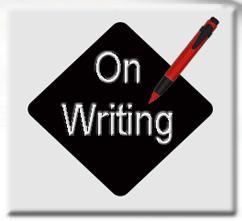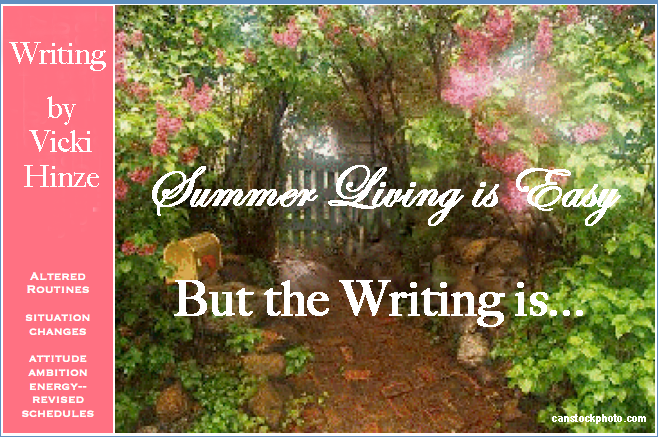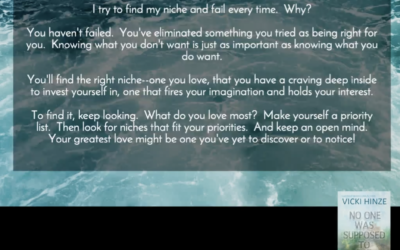Summer. We anticipate it, dream about it–and during those bleak, blustery winter days, we shiver and crave it. We build these images in our minds of warm, lazy days when we lean back under the shade of an old craggy oak with a pen and pad or our laptop, ignore clocks and just write until the warmth seduces us into a blissful little nap.
One of my writer friends likes to garden and write, and often she pauses from one to do the other. A favorite “summer” thing for her is to kick back in the wheelbarrow and cloud-dream. She says some of her best ideas come then. And there is something about summer that inspires the muse in us. My special place is at the beach. No dream seems too big or too complex or too risky when I’m sitting in the sand looking out on the horizon. And nothing infuses me with the “Yes, I dare” like the sounds of the wind and the waves crashing on the shore.
But with summer comes other things that impact our writing. And some of those things aren’t conducive to dreaming or even functioning at peak performance. And we’ve got to deal with those things, too–hopefully in a constructive way. Because if we don’t, then we’re not going to be doing much writing, and what we do write will only come with the pulling of hair and the spitting of nails: two things best avoided, particularly when writing entertaining fiction.
Things. What things?
There are many, but we’ll look at a few of the most prevalent for the largest number of people.
ROUTINE. During the winter, the kids are in school and the writer is self-programmed, if you will, to write from, say, 10-2 every day. Only now the kids are home and their lunch break, swimming lessons, ball practice or other activities fall right in the middle of your writing time. This doesn’t mean that the writer does write. It means the writer has to shift the writing time to one that doesn’t conflict with other obligations. That might require splitting writing time. For example, a 10-2 writer might write 9-11 and then again from 2-4.
Changes in routine are relatively easy to adopt but require discipline (on the part of the writer and on those at home with the writer) to enact and make functional.
A tip: the writer knows when s/he produces best. If at all possible, alter the routine around that time.
Why is routine important? Because when the writer works in routine, mentally s/he has self-programmed to produce on that routine. The good news is many experts say a routine can become a routine in twelve days. (Twelve is the magic number. Remember, many very successful modification programs are 12-step programs.)
SITUATION CHANGES. Some people winter in Florida and summer up north, or summer in Florida and head north for winter. Vacations. Stepchildren, parents or others coming for a month or two or life at home is left behind for the annual move to the beach house. Some businesses alter their hours, close on Fridays. Half the world you need to talk to is “away on vacation.”
The writer who expects these situational changes can make allowances by scheduling deadlines accordingly, by timing projects so that as much as possible can be done “alone” versus working aspects of projects that rely on others.
It also makes it apparent why the writer’s flexibility (writing anywhere in any manner versus “I can only write in total silence in my office at the computer) is so important.
Situations always change, particularly during the summer, and so being flexible and working with those changes makes for a less frustrated, frazzled writer. And that makes for a more productive writer.
ATTITUDE. Because writers are so accustomed to uninterrupted writing time, or writing time with minimal interruptions, summer can bring frustration and irritation–but only if the writer allows it. Two ways to minimize this is to set perimeters and be clear about your expectations with others in your circle. The second is for the writer to adopt a positive attitude. If s/he isn’t unnerved by little interruptions, then the writing won’t be unnerved by it–the process will take them in stride and work around them. If, however, the writer is seething, then the writing will suffer the effects of that as well. So control your emotions and determine that you will have a positive, constructive, laid back attitude about interruptions, noise levels, the busy-ness taking place around you, and write–and enjoy it.
Plan on more breaks, and if you’re usually writing 20 pages per day, scale back to 10 pages. Lessen the demand to give yourself the latitude you need to accept these alterations and demands on your time and space with dignity and grace. Your blood pressure will thank you. Your editor and agent and manuscript will, too.
AMBITION. Most people are less ambitious during the summer, and that’s true too of writers. Many write less, or less often, and don’t require the production output from themselves they typically require.
Conversely, some writers flip their entire schedule and are more ambitious writers during the summer months. My dear friend DELIA PARR, (Refining Emma, Bethany House), is one such author. Delia teaches high school. During the school year, she does her extensive research for her next novel. Then, when school is out for the summer, she heads to the beach and writes the entire book. Delia has worked this way for many years, and she’s found a rhythm that has been very successful for her.
Other writers research in summer, write in winter, and some don’t write at all during the summer months but focus their attention and efforts on promotional activities and all the business-related tasks that are not manuscript production.
DEBRA WEBB (Ruthless, Pink House Press), who has written over seventy books in the last eight years, writes outside on her laptop so she can enjoy the summer weather. To meet her deadlines, she can’t alter her production, but she can alter her method of producing, which enables her to enjoy the flowers she loves.
Other writers, like KATHY CARMICHAEL (The Texas Two-Step series, EPublishing Works!), are equally ambitious winter and summer–no changes required.
The point is, you need to know which type of writer you are. In summer are you more ambitious, less ambitious, or is there no notable difference? If you know the answer to that, then you can adapt to conditions that are perfect for you. Bottom line, you’re after what works best and under conditions where you produce your best work. Know how summer impacts your ambition helps create your optimum environment.
ENERGY. You can be the most ambitious person in the world, have created the ultimate perfect conditions, but still not have the energy to produce diddly-squat. What is your energy level during the summer?
Well, if you live in Florida, as I do, and you’re among the majority, as I am, you’d better know that you’re going to spend at least a few weeks feeling pretty raunchy from allergens. People who have never suffered from allergies, often do here.
If you know that, then you’re in a position to do a little preventative work–on your production, schedule and also on minimizing your exposure.
A couple years ago, I lost my voice totally for nearly a week–oak pollen. Many here have pine allergies, too, and the garden variety “stay inside until everything yellow turns green” allergies.
With air-conditioning filters, one can nix a lot of the impact. By avoiding going outside early in the morning–allergens are worse then–one can avoid more impact.
Even people who haven’t before suffered allergies end up with sinusitis, bronchitis, strep, and often all this nonsense ends up with a grand finale round of pneumonia.
Knowing this, I schedule “light” springs and limit outside activities to afternoon and evenings. Then I survive the season and am able to actually enjoy the summer.
Every area has its special summer challenges as well as its delights. What are yours and how do they impact your energy level?
Know before summer arrives so you are prepared and plan accordingly. You might just be able to prevent exposure and avoid things certain to take your energy level for nose-dives. Wouldn’t that be a blessing?
Summer can be a wonderful time for writers. The change of pace–or not–can be invigorating. The more we know about how the seasonal changes impact us and our work, the higher our odds of it being fantastic, fun and productive. ❦
——————
Vicki Hinze is the award-winning bestselling author of nearly thirty novels in a variety of genres including, suspense, mystery, thriller, and romantic or faith-affirming thrillers. Her latest releases are: Legend of the Mist (time-travel romantic suspense,)Torn Loyalties (inspirational romantic suspense), Duplicity (mystery/thriller), One Way to Write a Novel (nonfiction). She holds a MFA in Creative Writing and a Ph.D. in Philosophy, Theocentric Business and Ethics. Hinze’s online community: Facebook. Books. Twitter. Contact. www.vickihinze.com.







